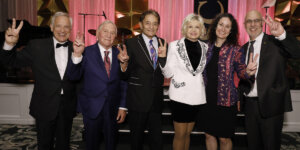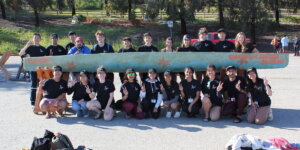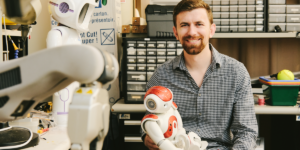
Watershield is one of 15 teams competing in this year’s MEPC. (Photo/Courtesy of Watershield)
Weston Lord looked forward to the showers.
As a cancer patient, the 2020 graduate of the USC Marshall School of Business remembers how mentally, physically and spiritually cleansing he felt as warm water washed over him after a long day battling for his life. Unfortunately, Lord could shower for no more than 2 minutes and 20 seconds. Any longer and the water repellant shields protecting the hole in his chest that attached to a central venous catheter would wash away, potentially exposing Lord to waterborne diseases.
The risk is real. Cancer patients using a central venous catheter who contract waterborne infections spend an average of 24 additional days in the hospital and increased mortality rates of 35%, according to the Centers for Disease Control and Prevention (CDC). To protect themselves, they often fashion protective coverings out of garbage bags or struggle with shields that fall off too easily or rip their skin when removed.
Lord thought there had to be a better way. A survivor of two subsequent bouts with leukemia, he came up with an idea for the Watershield. The medical device, a pain-free moisture barrier, offers cancer patients with a central venous catheter a more comfortable, infection-proof – and more leisurely – shower experience, he said. Working with Maral Mousavi, a USC Viterbi assistant professor of biomedical engineering; Golnaz Dianat, Ph.D. Chem ’19, a postdoctoral fellow in Mousavi’s lab; and Farbod Ghasemi, a BME doctoral student, Lord and his Watershield colleagues have fashioned a device made of silicone-based polymers that retains adhesion to skin without the use of irritating chemical-based adhesives.
To validate their concept and understand customer needs, the members of Watershield have joined the Maseeh Entrepreneurship Prize Competition, or MEPC. Over the next four and a half months, Watershield and 14 other USC Viterbi student-led teams will attend workshops to learn about critical business aspects of developing companies, such as customer discovery and intellectual property, among other topics. The National Science Foundation Innovation Corps (“I-Corps”) program, the nationally recognized lean startup program focused on technology commercialization, will provide the curriculum and $500 customer discovery grants to each team.
“To have Viterbi’s expertise and connections is something that we would really like to bring into our venture,” said Weston, adding that the Watershield technology could also one day be used to protect wounds.
On Tuesday, Nov. 30, the 11th anniversary edition of MEPC held its official kickoff over Zoom. At the event, the aspiring entrepreneurs met for the first time with team mentors, who will help them translate their ideas into viable companies. The semifinals will take place in March with the MEPC finals slated for a month later. Each team must have a minimum of one USC Viterbi student.
At stake in the competition is a $50,000 grand prize and more than $50,000 in free legal services offered by DLA Piper, Morrison & Foerster and NovusGC.
“MEPC provides a way for entrepreneurial and innovative teams to fine-tune their model and approach and to understand how to become a successful startup and possibly an important new venture,” USC Viterbi Dean Yannis Yortsos said. “It is a concrete example of developing a mindset and the tools for innovation and entrepreneurship, and arguably the best such competition at USC and among the pre-eminent in the nation.”
MEPC aim to inspire USC Viterbi engineering students to develop solutions for some of the world’s biggest challenges, including energy, health, safety, education or the environment, said MEPC director Alice Liu. Liu, Pai-Ling Yin of the Lloyd Greif Center for Entrepreneurial Studies at the USC Marshall School of Business and Rob Schoeben, an adjunct professor of entrepreneurship at Lloyd Greif Center for Entrepreneurial Studies, will teach this year’s workshops.
“The advice participants receive from our wonderful, experienced industry mentors is worth far more than the prize money they receive,” said Yin, now in her fifth year as an MEPC instructor. “The students form life-long, valuable networks.”
This year’s competition features a wide variety of burgeoning small businesses, ranging “from healthcare to a robot lifeguard to a home kit for growing spirulina,” Liu said. “This year has a really interesting set of diverse teams.”
The roster includes Strategic Interaction, which teaches negotiation skills via an AI-powered learning platform that incorporates game theory and intelligent tutoring techniques to provide feedback. Cubee uses semi-automated robotic systems with self-disinfecting abilities to keep COVID-19 from infecting inpatient beds at assisted living facilities, while LISUS Lithium
Hopes to improve lithium extraction efficiency by using remote sensing, AI, and a novel method to detect saline locations that contain deposits.
MEPC, founded in 2010 with a $1 million endowment from entrepreneur Fariborz Maseeh, has become one of the university’s premier business model competitions for USC Viterbi and other students, faculty and other would-be business builders.
Over the past decade, MEPC has launched several promising companies.
The 2020 MEPC winner, GrayMatter Robotics, hopes to leverage AI to create smart and rapidly deployable robotic assistants to automate high-mix manufacturing tasks. AIRBOND, the 2019 victor now called Apogee Composites, has designed a more efficient and cheaper way to produce carbon fiber composite materials for the aviation and other industries.
Thermal View Monitoring, the 2017 winner, has developed an image guidance system that provides a real-time, 3-D temperature map during thermal ablation therapy. Unlike with MRIs and CTs, physicians could take quality images right in the operating room, saving significant time and money. AesculaTech, the 2016 runner up, develops and manufactures a platform of temperature-responsive smart materials for use in medical devices, including the treatment of dry eye. After MEPC, AesculaTech received an invitation to Y Combinator, the famed Bay Area business incubator.
Second Spectrum, the 2013 victor, analyzes big data for insights into sport performance, such as what constitutes good defense and offense in basketball. Currently, all NBA teams receive Second Spectrum optical tracking data, which powers next-generation analytics.
MEPC mentor Jamie Wood, B.S. ISE ’89, said she felt energized after attending the competition kickoff.
An investor consultant for the Gerson Lehrman Group, the former entrepreneur said she looks forward to teaching would-be business builders how to start a company, make it profitable and sell it to a big company, as she did in 2008 when Mattel Inc. bought her five-year-old toy firm.
“I love the youth and enthusiasm of team members and really enjoy working with them,” said Wood, a three-time MEPC mentor. “For them everything is new and exciting. When they have a new idea, you can see the lightbulb go off. It’s really cool.”
Published on December 7th, 2020
Last updated on December 11th, 2020










